Yinuo Wang
TourPlanner: A Competitive Consensus Framework with Constraint-Gated Reinforcement Learning for Travel Planning
Jan 08, 2026Abstract:Travel planning is a sophisticated decision-making process that requires synthesizing multifaceted information to construct itineraries. However, existing travel planning approaches face several challenges: (1) Pruning candidate points of interest (POIs) while maintaining a high recall rate; (2) A single reasoning path restricts the exploration capability within the feasible solution space for travel planning; (3) Simultaneously optimizing hard constraints and soft constraints remains a significant difficulty. To address these challenges, we propose TourPlanner, a comprehensive framework featuring multi-path reasoning and constraint-gated reinforcement learning. Specifically, we first introduce a Personalized Recall and Spatial Optimization (PReSO) workflow to construct spatially-aware candidate POIs' set. Subsequently, we propose Competitive consensus Chain-of-Thought (CCoT), a multi-path reasoning paradigm that improves the ability of exploring the feasible solution space. To further refine the plan, we integrate a sigmoid-based gating mechanism into the reinforcement learning stage, which dynamically prioritizes soft-constraint satisfaction only after hard constraints are met. Experimental results on travel planning benchmarks demonstrate that TourPlanner achieves state-of-the-art performance, significantly surpassing existing methods in both feasibility and user-preference alignment.
HeadLighter: Disentangling Illumination in Generative 3D Gaussian Heads via Lightstage Captures
Jan 05, 2026Abstract:Recent 3D-aware head generative models based on 3D Gaussian Splatting achieve real-time, photorealistic and view-consistent head synthesis. However, a fundamental limitation persists: the deep entanglement of illumination and intrinsic appearance prevents controllable relighting. Existing disentanglement methods rely on strong assumptions to enable weakly supervised learning, which restricts their capacity for complex illumination. To address this challenge, we introduce HeadLighter, a novel supervised framework that learns a physically plausible decomposition of appearance and illumination in head generative models. Specifically, we design a dual-branch architecture that separately models lighting-invariant head attributes and physically grounded rendering components. A progressive disentanglement training is employed to gradually inject head appearance priors into the generative architecture, supervised by multi-view images captured under controlled light conditions with a light stage setup. We further introduce a distillation strategy to generate high-quality normals for realistic rendering. Experiments demonstrate that our method preserves high-quality generation and real-time rendering, while simultaneously supporting explicit lighting and viewpoint editing. We will publicly release our code and dataset.
P-MIA: A Profiled-Based Membership Inference Attack on Cognitive Diagnosis Models
Nov 06, 2025



Abstract:Cognitive diagnosis models (CDMs) are pivotal for creating fine-grained learner profiles in modern intelligent education platforms. However, these models are trained on sensitive student data, raising significant privacy concerns. While membership inference attacks (MIA) have been studied in various domains, their application to CDMs remains a critical research gap, leaving their privacy risks unquantified. This paper is the first to systematically investigate MIA against CDMs. We introduce a novel and realistic grey box threat model that exploits the explainability features of these platforms, where a model's internal knowledge state vectors are exposed to users through visualizations such as radar charts. We demonstrate that these vectors can be accurately reverse-engineered from such visualizations, creating a potent attack surface. Based on this threat model, we propose a profile-based MIA (P-MIA) framework that leverages both the model's final prediction probabilities and the exposed internal knowledge state vectors as features. Extensive experiments on three real-world datasets against mainstream CDMs show that our grey-box attack significantly outperforms standard black-box baselines. Furthermore, we showcase the utility of P-MIA as an auditing tool by successfully evaluating the efficacy of machine unlearning techniques and revealing their limitations.
PrivacyCD: Hierarchical Unlearning for Protecting Student Privacy in Cognitive Diagnosis
Nov 06, 2025Abstract:The need to remove specific student data from cognitive diagnosis (CD) models has become a pressing requirement, driven by users' growing assertion of their "right to be forgotten". However, existing CD models are largely designed without privacy considerations and lack effective data unlearning mechanisms. Directly applying general purpose unlearning algorithms is suboptimal, as they struggle to balance unlearning completeness, model utility, and efficiency when confronted with the unique heterogeneous structure of CD models. To address this, our paper presents the first systematic study of the data unlearning problem for CD models, proposing a novel and efficient algorithm: hierarchical importanceguided forgetting (HIF). Our key insight is that parameter importance in CD models exhibits distinct layer wise characteristics. HIF leverages this via an innovative smoothing mechanism that combines individual and layer, level importance, enabling a more precise distinction of parameters associated with the data to be unlearned. Experiments on three real world datasets show that HIF significantly outperforms baselines on key metrics, offering the first effective solution for CD models to respond to user data removal requests and for deploying high-performance, privacy preserving AI systems
DeepAgent: A General Reasoning Agent with Scalable Toolsets
Oct 24, 2025Abstract:Large reasoning models have demonstrated strong problem-solving abilities, yet real-world tasks often require external tools and long-horizon interactions. Existing agent frameworks typically follow predefined workflows, which limit autonomous and global task completion. In this paper, we introduce DeepAgent, an end-to-end deep reasoning agent that performs autonomous thinking, tool discovery, and action execution within a single, coherent reasoning process. To address the challenges of long-horizon interactions, particularly the context length explosion from multiple tool calls and the accumulation of interaction history, we introduce an autonomous memory folding mechanism that compresses past interactions into structured episodic, working, and tool memories, reducing error accumulation while preserving critical information. To teach general-purpose tool use efficiently and stably, we develop an end-to-end reinforcement learning strategy, namely ToolPO, that leverages LLM-simulated APIs and applies tool-call advantage attribution to assign fine-grained credit to the tool invocation tokens. Extensive experiments on eight benchmarks, including general tool-use tasks (ToolBench, API-Bank, TMDB, Spotify, ToolHop) and downstream applications (ALFWorld, WebShop, GAIA, HLE), demonstrate that DeepAgent consistently outperforms baselines across both labeled-tool and open-set tool retrieval scenarios. This work takes a step toward more general and capable agents for real-world applications. The code and demo are available at https://github.com/RUC-NLPIR/DeepAgent.
Can SSD-Mamba2 Unlock Reinforcement Learning for End-to-End Motion Control?
Sep 09, 2025Abstract:End-to-end reinforcement learning for motion control promises unified perception-action policies that scale across embodiments and tasks, yet most deployed controllers are either blind (proprioception-only) or rely on fusion backbones with unfavorable compute-memory trade-offs. Recurrent controllers struggle with long-horizon credit assignment, and Transformer-based fusion incurs quadratic cost in token length, limiting temporal and spatial context. We present a vision-driven cross-modal RL framework built on SSD-Mamba2, a selective state-space backbone that applies state-space duality (SSD) to enable both recurrent and convolutional scanning with hardware-aware streaming and near-linear scaling. Proprioceptive states and exteroceptive observations (e.g., depth tokens) are encoded into compact tokens and fused by stacked SSD-Mamba2 layers. The selective state-space updates retain long-range dependencies with markedly lower latency and memory use than quadratic self-attention, enabling longer look-ahead, higher token resolution, and stable training under limited compute. Policies are trained end-to-end under curricula that randomize terrain and appearance and progressively increase scene complexity. A compact, state-centric reward balances task progress, energy efficiency, and safety. Across diverse motion-control scenarios, our approach consistently surpasses strong state-of-the-art baselines in return, safety (collisions and falls), and sample efficiency, while converging faster at the same compute budget. These results suggest that SSD-Mamba2 provides a practical fusion backbone for scalable, foresightful, and efficient end-to-end motion control.
Distributional Soft Actor-Critic with Diffusion Policy
Jul 02, 2025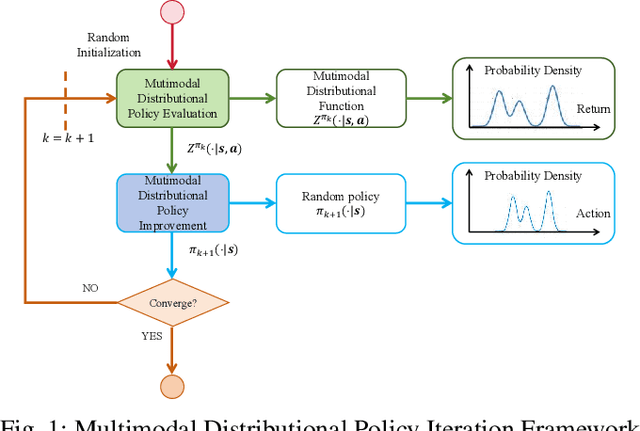
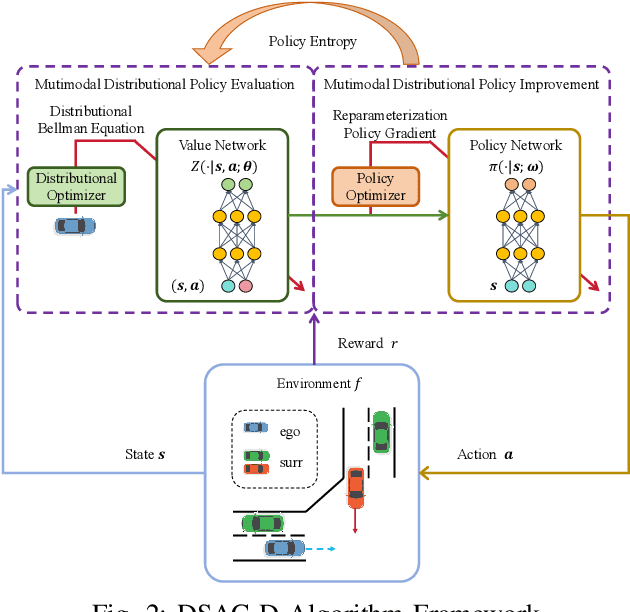
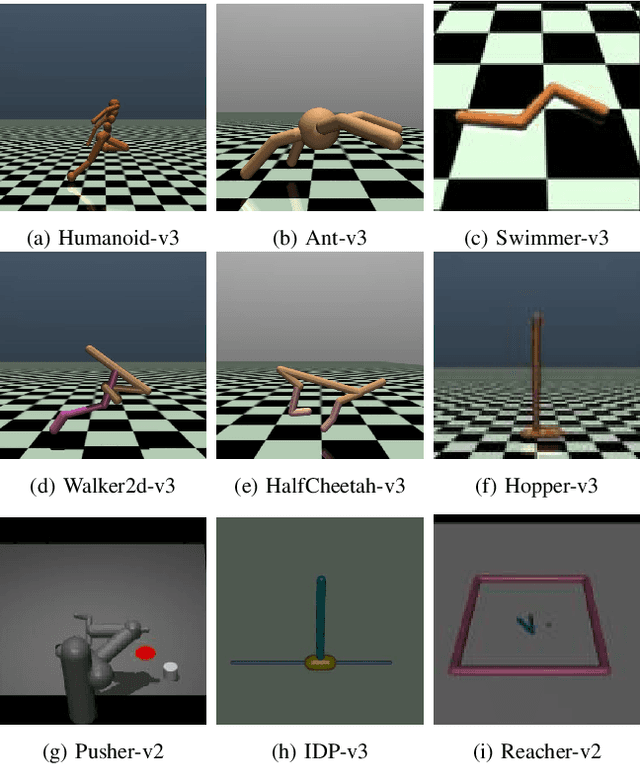
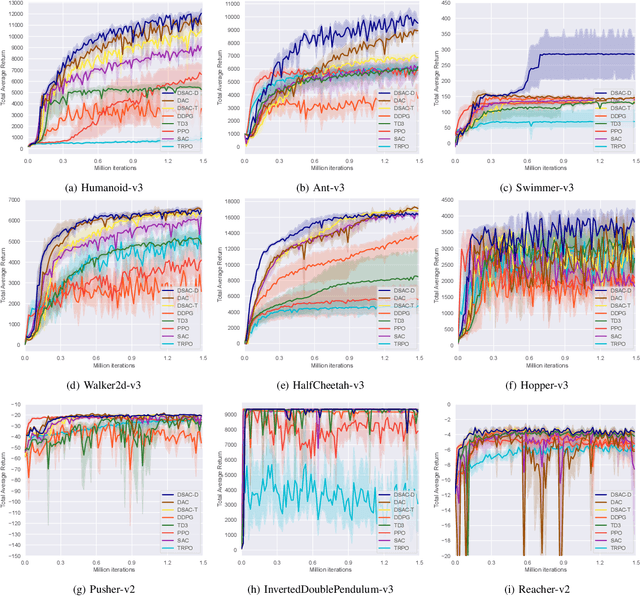
Abstract:Reinforcement learning has been proven to be highly effective in handling complex control tasks. Traditional methods typically use unimodal distributions, such as Gaussian distributions, to model the output of value distributions. However, unimodal distribution often and easily causes bias in value function estimation, leading to poor algorithm performance. This paper proposes a distributional reinforcement learning algorithm called DSAC-D (Distributed Soft Actor Critic with Diffusion Policy) to address the challenges of estimating bias in value functions and obtaining multimodal policy representations. A multimodal distributional policy iteration framework that can converge to the optimal policy was established by introducing policy entropy and value distribution function. A diffusion value network that can accurately characterize the distribution of multi peaks was constructed by generating a set of reward samples through reverse sampling using a diffusion model. Based on this, a distributional reinforcement learning algorithm with dual diffusion of the value network and the policy network was derived. MuJoCo testing tasks demonstrate that the proposed algorithm not only learns multimodal policy, but also achieves state-of-the-art (SOTA) performance in all 9 control tasks, with significant suppression of estimation bias and total average return improvement of over 10\% compared to existing mainstream algorithms. The results of real vehicle testing show that DSAC-D can accurately characterize the multimodal distribution of different driving styles, and the diffusion policy network can characterize multimodal trajectories.
Enhanced DACER Algorithm with High Diffusion Efficiency
May 29, 2025Abstract:Due to their expressive capacity, diffusion models have shown great promise in offline RL and imitation learning. Diffusion Actor-Critic with Entropy Regulator (DACER) extended this capability to online RL by using the reverse diffusion process as a policy approximator, trained end-to-end with policy gradient methods, achieving strong performance. However, this comes at the cost of requiring many diffusion steps, which significantly hampers training efficiency, while directly reducing the steps leads to noticeable performance degradation. Critically, the lack of inference efficiency becomes a significant bottleneck for applying diffusion policies in real-time online RL settings. To improve training and inference efficiency while maintaining or even enhancing performance, we propose a Q-gradient field objective as an auxiliary optimization target to guide the denoising process at each diffusion step. Nonetheless, we observe that the independence of the Q-gradient field from the diffusion time step negatively impacts the performance of the diffusion policy. To address this, we introduce a temporal weighting mechanism that enables the model to efficiently eliminate large-scale noise in the early stages and refine actions in the later stages. Experimental results on MuJoCo benchmarks and several multimodal tasks demonstrate that the DACER2 algorithm achieves state-of-the-art performance in most MuJoCo control tasks with only five diffusion steps, while also exhibiting stronger multimodality compared to DACER.
Zero-Shot Multi-modal Large Language Model v.s. Supervised Deep Learning: A Comparative Study on CT-Based Intracranial Hemorrhage Subtyping
May 14, 2025Abstract:Introduction: Timely identification of intracranial hemorrhage (ICH) subtypes on non-contrast computed tomography is critical for prognosis prediction and therapeutic decision-making, yet remains challenging due to low contrast and blurring boundaries. This study evaluates the performance of zero-shot multi-modal large language models (MLLMs) compared to traditional deep learning methods in ICH binary classification and subtyping. Methods: We utilized a dataset provided by RSNA, comprising 192 NCCT volumes. The study compares various MLLMs, including GPT-4o, Gemini 2.0 Flash, and Claude 3.5 Sonnet V2, with conventional deep learning models, including ResNet50 and Vision Transformer. Carefully crafted prompts were used to guide MLLMs in tasks such as ICH presence, subtype classification, localization, and volume estimation. Results: The results indicate that in the ICH binary classification task, traditional deep learning models outperform MLLMs comprehensively. For subtype classification, MLLMs also exhibit inferior performance compared to traditional deep learning models, with Gemini 2.0 Flash achieving an macro-averaged precision of 0.41 and a macro-averaged F1 score of 0.31. Conclusion: While MLLMs excel in interactive capabilities, their overall accuracy in ICH subtyping is inferior to deep networks. However, MLLMs enhance interpretability through language interactions, indicating potential in medical imaging analysis. Future efforts will focus on model refinement and developing more precise MLLMs to improve performance in three-dimensional medical image processing.
Diffusion Actor-Critic with Entropy Regulator
May 24, 2024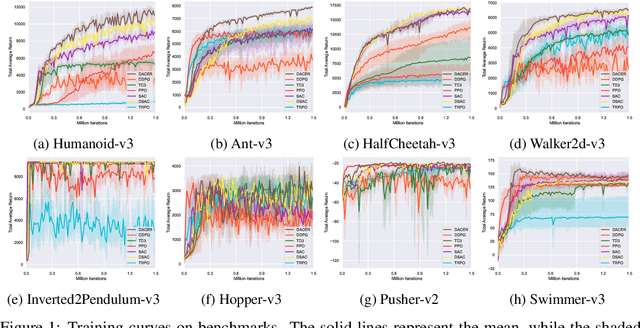

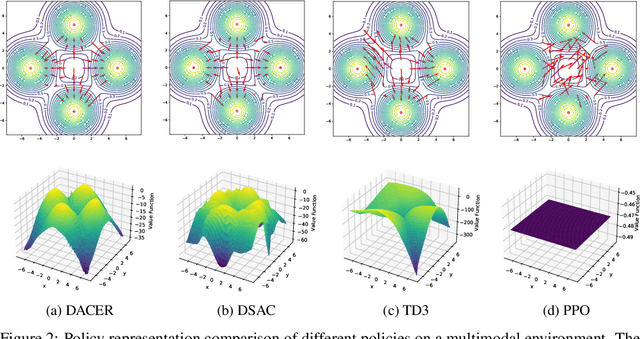
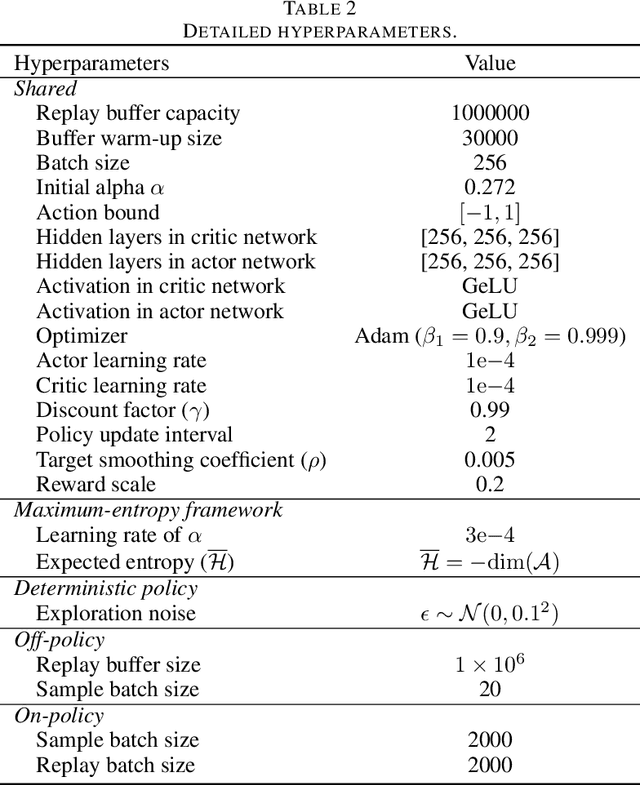
Abstract:Reinforcement learning (RL) has proven highly effective in addressing complex decision-making and control tasks. However, in most traditional RL algorithms, the policy is typically parameterized as a diagonal Gaussian distribution with learned mean and variance, which constrains their capability to acquire complex policies. In response to this problem, we propose an online RL algorithm termed diffusion actor-critic with entropy regulator (DACER). This algorithm conceptualizes the reverse process of the diffusion model as a novel policy function and leverages the capability of the diffusion model to fit multimodal distributions, thereby enhancing the representational capacity of the policy. Since the distribution of the diffusion policy lacks an analytical expression, its entropy cannot be determined analytically. To mitigate this, we propose a method to estimate the entropy of the diffusion policy utilizing Gaussian mixture model. Building on the estimated entropy, we can learn a parameter $\alpha$ that modulates the degree of exploration and exploitation. Parameter $\alpha$ will be employed to adaptively regulate the variance of the added noise, which is applied to the action output by the diffusion model. Experimental trials on MuJoCo benchmarks and a multimodal task demonstrate that the DACER algorithm achieves state-of-the-art (SOTA) performance in most MuJoCo control tasks while exhibiting a stronger representational capacity of the diffusion policy.
 Add to Chrome
Add to Chrome Add to Firefox
Add to Firefox Add to Edge
Add to Edge